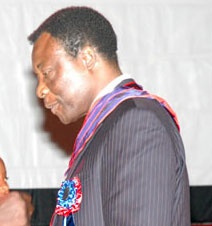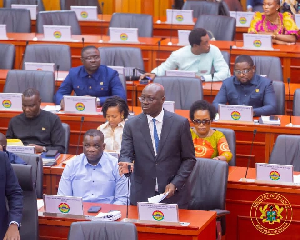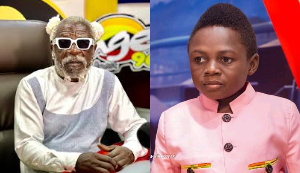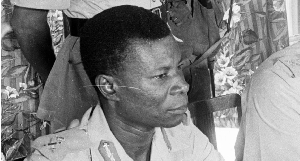Cocaine: After The Underworld Summit Meeting
HOW KOFI BOAKYE ESCAPES ARREST
Francis Poku’s Led Faction Provides Everlasting Protection
Despite his virtual admission of culpability during the underworld summit meeting in his house captured on the infamous tape, the hitherto darling boy of the police service, ACP Kofi Boakye, escapes arrest and continues to enjoy his freedom largely because of his apparent membership of the Francis Poku's (pictured) led faction within the nation's security set up.
The Heritage can reveal that the scandal-spattered security set-up is divided between two factions: the Francis Poku-led faction and the IGP Patrick Acheampong-led faction, with each trying to undo the other in a rival war that rages long before the emergence of this cocaine scandal.
Continuous searches by the Heritage radar reveal that ACP Kofi Boakye, together with Supt. Patrick Ampewuah, and Supt. Edward Tabiri belong to the Francis Poku's faction, while the Inspector-General of Police (IGP) is isolated and pushed to the background.
Both the Interior Ministry and the Attorney General's Department, the Heritage has learnt, at some point, were pushing for the arrest of the now absentee Director-General of Operations, after the tape was played at the Georgina Wood Committee but there was fierce resistance from the National Security Coordinator, Francis Poku, who cited among others, threat to national security that such a venture could create.
Besides, there were grumblings within the junior ranks especially the Striking Force of the Police Service, some of whom were detailed at the committee's sittings, over any attempt at arresting their hero, ACP Kofi Boakye.
Police sources have told this paper that ACP Boakye enjoys tremendous support from the Police, especially among the junior ranks of the service who see him as their hero and role model.
The Heritage has learnt that the IGP is bitter over what he sees as the frequent complaints the National Security Minister makes to President Kufuor, at times over trivial issues pertaining to police operations.
For instance, the IGP, according to his close confidants, has alleged that he has received presidential summons for more than ten times over complaints made against him by the National Security Minister.
Close confidants of the IGP have told this paper that the IGP's beef is that, as the superior officer, he expects the minister to summon him anytime he has any problem with his duties, instead of reporting him directly to the president.
The Heritage has learnt that in some cases, the IGP has to labour before he could convince the President of his innocence in particular matters.
In the tape conversation with the underworld figures at his residence, ACP Kofi Boakye has confirmed his differences with the IGP but maintained that he intends protecting him this time, despite those differences.
"Right now, my main aim is to protect the IGP. You know that, in spite of our differences in the past Alhaji… you know that, first when I get angry with the IGP, I call you. What did you say Yaw Billa told you?" He said at a meeting with the barons who converged at his residence for that underworld summit.
ACP Bokye's apparent admission to complexity in the underworld cocaine business was copiously captured in the official transcript of his conversation with the drug barons. "When the Columbians and the Venezuelans brought some goods to Ghana and you bought houses at Airport, Manet and Sakumono, I monitored the vessel from Togo before we arrested the wife of the Venezuelan on the boat and the information was kept amongst us. They were later arrested by Apeatu."
The Chronicle newspaper in an earlier publication alleged that a vessel from Togo carrying some consignments of cocaine was traced by some security officers but was later allowed to enter the nation's territorial waters after an amount of $1m was collected by the said security officials trailing the vessel.
Security sources have told this paper that ACP Boakye was forced to proceed on leave partly because he had in his conversation with the suspected barons made reference to the said vessel that the Chronicle has referred to in one of its publications on the murky underworld activity.
The Heritage has learnt that part of the strategy adopted by the senior police officers and the barons is that, in some cases, high profile drug dealers tip off their friends in the senior rank of the police service of a deal that they know is going on.
After the police swoop, the same barons who surreptitiously give the tip-off resurface to mediate between the other barons and the police after which if there is a settlement (with bribe to the police) they also get their share of the proceeds and varnish.
Again, the Heritage has learnt that senior police officers arrest barons, collect bribes and set them free. Afterwards they inform other colleagues within the same senior ranks who again will re-arrest the same barons, demand another bribe and then set them free.
According to security sources, at times, some barons alert their friends within the high echelons of the police service when they are about to sell drugs to their client, then immediately after those barons have handed over the goods to those clients the police arrest the clients and demand bribes.
"I'm in this case because my name has cropped up but I know nothing about these goods. Alhaji once called me about a case I never understood. About five days ago he told me that his friends have informed him that there is some business in town and that if I know where the goods are I should come and seize it so that he can also get his share as a mediator." ACP Boakye said in his conversation with the barons at his residence.













